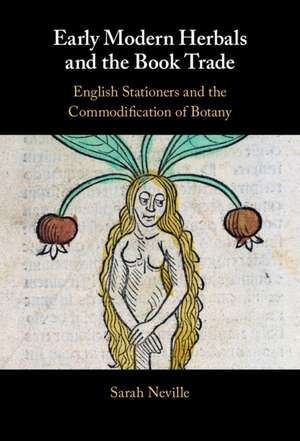Early Modern Herbals and the Book Trade: English Stationers and the Commodification of Botany
Autor Sarah Nevilleen Limba Engleză Hardback – 5 ian 2022
| Toate formatele și edițiile | Preț | Express |
|---|---|---|
| Paperback (1) | 177.62 lei 3-5 săpt. | +15.87 lei 7-13 zile |
| Cambridge University Press – 22 aug 2024 | 177.62 lei 3-5 săpt. | +15.87 lei 7-13 zile |
| Hardback (1) | 530.47 lei 3-5 săpt. | +25.38 lei 7-13 zile |
| Cambridge University Press – 5 ian 2022 | 530.47 lei 3-5 săpt. | +25.38 lei 7-13 zile |
Preț: 530.47 lei
Preț vechi: 576.60 lei
-8% Nou
Puncte Express: 796
Preț estimativ în valută:
101.51€ • 108.54$ • 84.63£
101.51€ • 108.54$ • 84.63£
Carte disponibilă
Livrare economică 27 martie-10 aprilie
Livrare express 13-19 martie pentru 35.37 lei
Preluare comenzi: 021 569.72.76
Specificații
ISBN-13: 9781316515990
ISBN-10: 1316515990
Pagini: 290
Dimensiuni: 158 x 235 x 20 mm
Greutate: 0.58 kg
Editura: Cambridge University Press
Colecția Cambridge University Press
Locul publicării:Cambridge, United Kingdom
ISBN-10: 1316515990
Pagini: 290
Dimensiuni: 158 x 235 x 20 mm
Greutate: 0.58 kg
Editura: Cambridge University Press
Colecția Cambridge University Press
Locul publicării:Cambridge, United Kingdom
Cuprins
Prologue. Milton's trees; Introduction. Authorizing English botany; Part I. A History of Herbals: 1. Authorship, book history, and the effects of artifacts; 2. The stationers' company and constraints on English printing; 3. Salubrious illustration and the economics of English herbals; Part II. Anonymity in the Printed English Herbal: 4. Reframing competition: the curious case of the little Herball; 5. The Grete Herball and evidence in the margins; 6. 'Unpublished virtues of the earth': books of healing on the English renaissance stage; Part III. Authors and the Printed English Herbal: 7. William Turner and the medical book trade; 8. John Norton and the redemption of John Gerard.
Recenzii
'Sarah Neville's fascinating account of how stationers contributed to the creation of botanical texts brings English herbals and the early modern book trade together for the first time. Her reframing of their history irrevocably alters our sense of their importance for the publishers who commissioned them, the printers who manufactured them, and the booksellers who retailed herbals as well as for the Renaissance physicians, lay medical practitioners, and elite and common readers who so frequently consulted them. Early modern ecocritics will want to read this book along with book historians, historians of science, and those interested in Renaissance literature and culture.' Valerie Wayne, University of Hawai'i at Mānoa
'In Early Modern Herbals and the Book Trade, herbals come to life as dynamic objects taking meaning from their print environment. Focusing on the material form of the book provides Neville with a crucial and nuanced tool for unveiling the commercial landscape out of which attitudes toward natural history were indelibly shaped in the early modern era. Rather than relying on an author-centered approach, this book puts printers, booksellers, craftsmen, editors, licensors, translators, playwrights, and readers center stage in the production of botanical knowledge. What we learn is that herbals are much more than repositories of information that mark progress within traditional terms often used by historians of science.' Wendy Wall, Northwestern University
'Informative, penetrating, and witty, Early Modern Herbals and the Book Trade helps us see anew a genre of book we're familiar with largely through their sumptuous illustrations. Immersing us in the fascinating world of botanical publications at the front end of the Enlightenment, Neville has produced a study that anyone interested in the early modern era's engagement with the natural world will want to read.' Douglas Bruster, The University of Texas at Austin
'In Early Modern Herbals and the Book Trade, herbals come to life as dynamic objects taking meaning from their print environment. Focusing on the material form of the book provides Neville with a crucial and nuanced tool for unveiling the commercial landscape out of which attitudes toward natural history were indelibly shaped in the early modern era. Rather than relying on an author-centered approach, this book puts printers, booksellers, craftsmen, editors, licensors, translators, playwrights, and readers center stage in the production of botanical knowledge. What we learn is that herbals are much more than repositories of information that mark progress within traditional terms often used by historians of science.' Wendy Wall, Northwestern University
'Informative, penetrating, and witty, Early Modern Herbals and the Book Trade helps us see anew a genre of book we're familiar with largely through their sumptuous illustrations. Immersing us in the fascinating world of botanical publications at the front end of the Enlightenment, Neville has produced a study that anyone interested in the early modern era's engagement with the natural world will want to read.' Douglas Bruster, The University of Texas at Austin
Notă biografică
Descriere
In the early modern herbal, Sarah Neville finds a captivating example of how Renaissance print culture shaped scientific authority.
